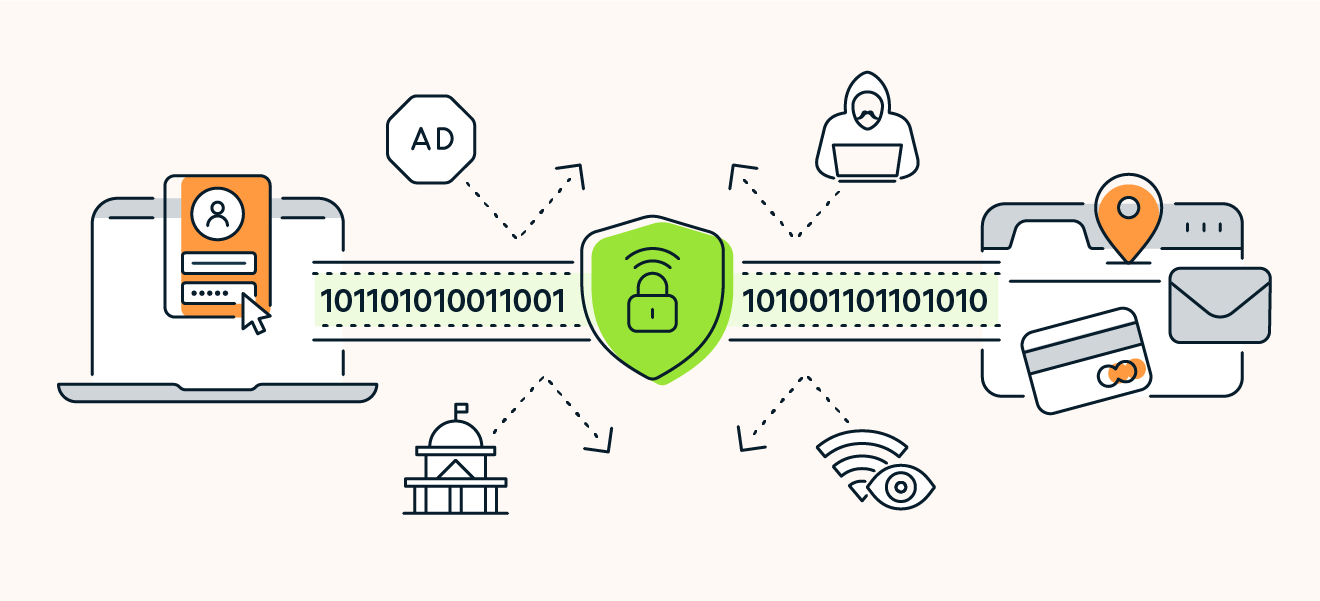What is P2P used for?
P2P (peer-to-peer) networks are used for distributing files on a network. On a P2P network, each computer acts as both a server and a client, storing and sharing files with other computers on the network. The decentralized distribution of P2P networks makes transferring and sharing files much easier.
If you download a 100 GB file from just one server, that server must use all its bandwidth for transferring the file. When you request the file through a P2P network, multiple devices work together to send that file to you.
How does P2P file-sharing work?
P2P works by distributing file-sharing resources across multiple devices. When you download a file on a P2P network, many different devices send you small parts of the file, without taxing the bandwidth of any individual device. A series of small, quick downloads from different sources allows the file transfer to complete more quickly.
While some P2P file-sharing software is associated with criminal activity, like pirated or illegal content, P2P functionality itself is not harmful or illegal. In fact, P2P enhances data safety and privacy. Security measures like OPSEC even improve the usefulness of P2P in military applications.
What is a P2P VPN server?
A P2P VPN server is a virtual private network that doesn't kick you off when you try to download from several sources. You get all the encryption benefits of a VPN, along with the efficient downloading of peer-to-peer networks. Encryption ensures that nobody will see your activity on the P2P or VPN — including your ISP or government.
Many VPNs for PC can detect P2P activity and either slow down or disconnect their service, as P2P networks are often associated with illegal downloading. Not only does a VPN for P2P keep you connected, it also protects and maintains your bandwidth and speed. Encryption ensures your web activity is not trackable to outside observers, and a no-log policy means that the VPN itself isn’t recording what you do online.
VPNs carry many benefits. Combining VPNs with P2P networks puts all the best functionality of the internet at your fingertips. Depending on the location of the VPN server, you may gain access to blocked sites or be able to stream content that you couldn’t watch before.
Do you need a VPN? It depends on what you do online. If you connect to P2P networks, or even if you just want to browse anonymously, then there are significant security and privacy advantages of setting up a VPN and turning it on.
 Avast SecureLine VPN has many servers that support P2P networking.
Avast SecureLine VPN has many servers that support P2P networking.
How does a P2P VPN server work?
A P2P VPN server works by routing your activity through an encryption tunnel before it reaches the internet, so nobody can see what you’re doing — even when you’re downloading a large file from several sources hosting that file.
Because VPNs encrypt the data traveling across their networks, your IP address is hidden both to your ISP and to the other peers on the network. Your ISP will be unable to associate your IP address with high activity, so they won’t throttle your connection, which can happen if your ISP detects behavior it doesn’t approve of.
Blocking P2P networks helps companies and streaming services control what content is visible online — they can also use practices like geoblocking. Protecting P2P networking with dedicated P2P VPNs is critical to keeping the internet an open and safe space for people to share ideas and content.
 P2P VPN servers let you bypass content restrictions and share files freely.
P2P VPN servers let you bypass content restrictions and share files freely.
There are many legitimate applications of P2P VPN servers. For example, if you’re a PhD student studying archaeology and your ISP throttles your connection, you might not be able to transfer the massive files of 3D models you’ve been working on. Restricting P2P networks means limiting human ingenuity and creativity.
What are the benefits of a P2P VPN?
A P2P VPN allows you to use peer-to-peer networks without risk or restriction. Without the security of a VPN, using P2P networks may expose you to ISPs who threaten denial of service or hackers in search of vulnerabilities to exploit. A P2P VPN prevents exposure on all fronts.
Despite their uncertain legality, torrents remain an effective and legitimate method for transferring large files. However, ISPs often throttle P2P torrent traffic on their networks, and many VPNs will not support P2P traffic. In these cases, dedicated P2P VPNs, like Avast SecureLine VPN, are critical.
 Many Avast SecureLine VPN server locations are optimized for P2P traffic.
Many Avast SecureLine VPN server locations are optimized for P2P traffic.
By using a P2P VPN server, your connection won’t be slowed down and your activity will be encrypted.
Servers supporting P2P usually offer better connections, so you won’t have to look up how to speed up your VPN connection. And, you’ll be free to take advantage of P2P to its utmost potential. Expand your online privacy by using a VPN for iOS or a VPN for Android too.
P2P vs dedicated servers
P2P networks are decentralized, meaning that tasks are shared among different users. Ideally, each individual file has multiple hosts to ensure it doesn’t get lost, blocked, or taken offline. P2P networks are good for keeping a library of files online, available, and distributed across many users — a group of disconnected users could make certain files inaccessible.
Because P2P servers are designed to be consistent and reliable, a dedicated P2P server can usually handle huge bandwidth requirements. Dedicated servers are ideal for complex operations that a lot of people rely on, like MMOs (massively multiplayer online games).
P2P vs Onion over VPN
The Onion Router network (Tor) passes your data through a number of proxy servers, adding layers of encryption and making it almost impossible to track your activity. Combined with a VPN, this makes connections very secure, but also severely impacts performance and response times.
Between VPN, proxy server, and Tor applications, there are many different pros and cons in terms of speed and security. Accessing Tor over VPN is quite secure, but it’s slow. Using the Tor browser might also prove tricky for some.
In comparison, P2P VPN servers add encryption to all traffic and prevent throttling. Your activity doesn’t need to be bounced around between so many middle men — it’s already encrypted by the VPN. With a P2P VPN, you get many of the same privacy benefits without the slowdown.
Is P2P safe with a VPN?
P2P is safe with a VPN because the encryption benefits mitigate the risks and restrictions associated with P2P.
Using torrents can expose your network to files from anonymous sources. Likewise, an ISP can easily spot P2P activity and restrict bandwidth. That’s why a P2P VPN is essential for maintaining privacy and security.
Not only does VPN tunneling hide P2P activity from your ISP — reducing the chances of throttling — but each piece of the large file that is sent and received will also be encrypted to enhance safety.
 P2P VPNs encrypt traffic from all connected sources, hiding your activity from ISPs, governments, and hackers.
P2P VPNs encrypt traffic from all connected sources, hiding your activity from ISPs, governments, and hackers.
VPNs are legal in many countrie — mostly, they’re only illegal in countries that emphasize censorship. And with P2P as secure as it’s ever been, large technology companies can’t fully control our internet experience. Considering how Google already uses our data, it’s important that we continue to protect our data privacy.
Secure your peer-to-peer data with Avast SecureLine VPN
Good VPN services that allow P2P traffic are rare. Thankfully, Avast SecureLine VPN has you covered. Avast SecureLine VPN prevents throttling and improves the security of P2P connections. Enjoy the best P2P functionality while remaining private to outside lurkers. Try Avast SecureLine VPN for free today.

 Avast SecureLine VPN has many servers that support P2P networking.
Avast SecureLine VPN has many servers that support P2P networking. P2P VPN servers let you bypass content restrictions and share files freely.
P2P VPN servers let you bypass content restrictions and share files freely. Many Avast SecureLine VPN server locations are optimized for P2P traffic.
Many Avast SecureLine VPN server locations are optimized for P2P traffic. P2P VPNs encrypt traffic from all connected sources, hiding your activity from ISPs, governments, and hackers.
P2P VPNs encrypt traffic from all connected sources, hiding your activity from ISPs, governments, and hackers.










